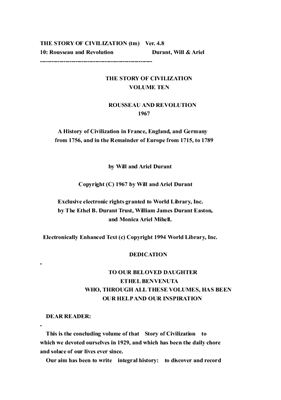Simon & Schuster, 1967. - 1469 p.
ISBN-10: 067163058X
Our aim has been to write integral history: to discover and record the economic, political, spiritual, moral, and cultural activities of each civilization, in each age, as interrelated elements in one whole called life, and to humanize the narrative with studies of the protagonists in each act of the continuing drama. While recognizing the importance of govement and statesmanship, we have given the political history of each period and state as the oft-told background,
rather than the substance or essence of the tale; our chief interest was in the history of the mind. Hence in matters economic and political we have relied considerably upon secondary sources, while in religion, philosophy, science, literature, music, and art we have
tried to go to the sources: to see each faith at work in its own habitat, to study the epochal philosophies in their major productions, to visit the art in its native site or later home, to enjoy the masterpieces of the world's literature, often in their own language, and to hear the great musical compositions again and again, if only by plucking them out of the miraculous air. For these purposes we have traveled around the world twice, and through Europe unnumbered times from 1912 to 1966. The humane reader will understand that it would have been impossible, in our one lifetime, to go to the original sources in economics and politics as well, through the sixty centuries and twenty civilizations of history. We have had to accept limits, and
acknowledge our limitations. We regret that we allowed our fascination with each canto of man's epic to hold us too willingly, with the result that we find ourselves exhausted on reaching the French Revolution. We know that this event did not end history, but it ends us. Unquestionably our integral and inclusive method has led us to give to most of these volumes a burdensome length. If we had written shredded history- the account of one nation or period or subject- we might have spared the reader's time and arms; but to visualize all phases in one narrative for several nations in a given period required space for the details needed to bring the events and the personalities to life. Each reader will feel that the book is too long, and that the treatment of his own nation or specialty is too brief.
ISBN-10: 067163058X
Our aim has been to write integral history: to discover and record the economic, political, spiritual, moral, and cultural activities of each civilization, in each age, as interrelated elements in one whole called life, and to humanize the narrative with studies of the protagonists in each act of the continuing drama. While recognizing the importance of govement and statesmanship, we have given the political history of each period and state as the oft-told background,
rather than the substance or essence of the tale; our chief interest was in the history of the mind. Hence in matters economic and political we have relied considerably upon secondary sources, while in religion, philosophy, science, literature, music, and art we have
tried to go to the sources: to see each faith at work in its own habitat, to study the epochal philosophies in their major productions, to visit the art in its native site or later home, to enjoy the masterpieces of the world's literature, often in their own language, and to hear the great musical compositions again and again, if only by plucking them out of the miraculous air. For these purposes we have traveled around the world twice, and through Europe unnumbered times from 1912 to 1966. The humane reader will understand that it would have been impossible, in our one lifetime, to go to the original sources in economics and politics as well, through the sixty centuries and twenty civilizations of history. We have had to accept limits, and
acknowledge our limitations. We regret that we allowed our fascination with each canto of man's epic to hold us too willingly, with the result that we find ourselves exhausted on reaching the French Revolution. We know that this event did not end history, but it ends us. Unquestionably our integral and inclusive method has led us to give to most of these volumes a burdensome length. If we had written shredded history- the account of one nation or period or subject- we might have spared the reader's time and arms; but to visualize all phases in one narrative for several nations in a given period required space for the details needed to bring the events and the personalities to life. Each reader will feel that the book is too long, and that the treatment of his own nation or specialty is too brief.

